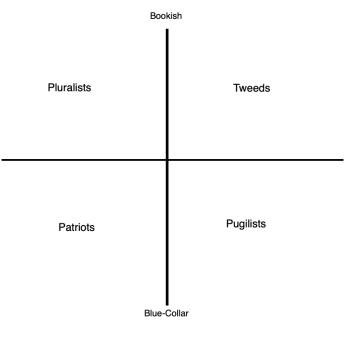 Earlier this week, I wrote about seeing Ron Howard’s new adaptation of J.D. Vance’s Hillbilly Elegy. And ever since then, I’ve been thinking about how disappointing it is that an otherwise well-made movie—with a number of interesting things to say about contemporary American life—is almost certainly going to be dismissed out of hand by a large faction of the modern pop-culture commentariat, for whom even the mention of the source material is a kind of political faux pas. In the midst of all that, I came across a particularly good article by Spencer Rider—interestingly enough, published in the radical leftist publication Negation Mag—that captures a number of things worth noting about the current critical landscape.
Earlier this week, I wrote about seeing Ron Howard’s new adaptation of J.D. Vance’s Hillbilly Elegy. And ever since then, I’ve been thinking about how disappointing it is that an otherwise well-made movie—with a number of interesting things to say about contemporary American life—is almost certainly going to be dismissed out of hand by a large faction of the modern pop-culture commentariat, for whom even the mention of the source material is a kind of political faux pas. In the midst of all that, I came across a particularly good article by Spencer Rider—interestingly enough, published in the radical leftist publication Negation Mag—that captures a number of things worth noting about the current critical landscape.
Over the years, I’ve gotten into the habit of reading a lot of culture criticism, ranging all the way from Walter Benjamin and Arthur Danto’s dense meditations on fine art to whatever Ross Douthat thinks of Quentin Tarantino or some freelancer at Polygon has to say about The Last of Us: Part II. I enjoy thinking and writing about ideas, expression, and the ways in which themes are communicated indirectly through symbols other than words. But throughout the last half-decade or so, this genre has become extraordinarily boring and tedious: readers confront, in Rider’s words, “a critical landscape that understands what it’s supposed to like without ever understanding why.” Everything is now politicized, and criticism has become increasingly unmoored from the actual artifacts that it’s supposed to be evaluating.
Rider focuses his analysis primarily on cinema, noting the rise of “films that are devoid of meaningful politics yet solely exist in the minds of critics as political signifiers”—such as 2016’s Ghostbusters remake, Star Wars: The Last Jedi, and Joker. These movies, irrespective of their actual content, have become culture-war footballs thanks to a hyperactive online ecosystem continually looking for new signaling tools. I would go a step further than Rider, though, and say that this pathology isn’t limited to movie criticism: it’s infected the entire field of culture writing.
The cycle of pop culture critique tends to follow a predictable pattern. First, some cultural artifact—a book, a movie, a video game, a longform news article—is released to wide approval. Second, there’s inevitably a backlash, ginned up at the intersection of sheer contrarianism and cash-strapped journalistic outlets jonesing for hate-clicks. (Some examples that immediately come to mind are Damien Chazelle’s La La Land, Donna Tartt’s The Goldfinch, and From Software’s Sekiro: Shadows Die Twice.) Third, among the people whose job it is to write about such things, the underlying work is permanently tainted by the backlash, so it becomes impossible to refer back to the underlying project in subsequent years without some tut-tutting mention of the surrounding “controversy” that emerged (even if that controversy reduced down to a handful of anonymous accounts saying snide things on Twitter).
Significantly, I don’t know that these “backlashes” would occur at all if works like La La Land, The Goldfinch, and Sekiro weren’t all genuinely compelling artistic creations (even if I’m too bad at video games to play through as much of Sekiro as I would’ve liked). They all have something interesting and potentially unsettling to say about the world, and as a result they’re all profoundly memorable. You could pass them on to your kids in 2030, and the underlying principles would still resonate.
But what if nuance isn’t really your thing? The cycle of critical response looks rather different for content with an overtly political message—at least, when that happens to dovetail roughly with the center-left consensus among culture journalists. Don’t believe me? Here’s an example: I read somewhere that one of the lead exclusives for the rebranded streaming service “HBO Max” was a movie called Unpregnant, about a pregnant teenager fleeing a state with restrictive abortion laws and road-tripping to a more progressive northern one. Sight unseen, I took a guess at predicting this movie’s “Tomatometer” score—that is, the percentage of critics on the aggregator site Rotten Tomatoes that gave the movie a favorable review. I came down at 92%. When I checked my work, the real-world Tomatometer read 89%. I was only off by 3%.
I don’t really think it’s a sign of a healthy critical environment when I can predict what material will be “approved” and “disapproved” solely on the basis of subject matter. But I do acknowledge that everyone has their biases, and the field of journalism has historically skewed in a more progressive direction. (Plus, in the Unpregnant case there’s probably some selection bias going on—which “conservative” outlets will review a movie like this?) It is what it is.
What concerns me much more is the notion that any cultural product that isn’t explicitly didactic—and didactic in the correct way—is inherently suspect, requiring the critic to go through it with a fine-toothed comb to find something “problematic.” This, I think, is a large part of why the cultural-criticism genre has grown so tedious to read: if a cultural product is interesting at all, it will be possible—if not necessarily plausible—to interpret it in a manner that’s offensive to somebody’s sensibilities.
It’s worth noting that a few months ago, I wrote about the value of black-and-white morality in the stories we tell, over against the ubiquity of morally murky antiheroes. I still think that—I don’t mean to suggest that “more ambiguity” is the answer to dull moralism. What I’m arguing here, rather, is that just because a story clearly reflects its creator’s moral framework doesn’t mean it has to transform into a screed about a particular set of political concerns. The Lord of the Rings is a pretty black-and-white story, but it doesn’t obviously preach a particular message at the viewer (except maybe anti-industrialization).
The critical point is that stories worth telling contain a thematic kernel that, presumably, will be meaningful to generations beyond this one, as opposed to simply trying to galvanize the viewer to support a specific cause within the next couple of years. And yet a large amount of culture writing increasingly seems to reflect the view that works can only be “relevant”—or even worth making at all—if they’re doing the latter.
This is one reason why, speaking for myself as a writer, I actually find it very liberating to work within the Christian tradition—because living as a Christian is an invitation to try to adopt an “eternal gaze” toward the world, and to be free to comment on true things wherever they can be found, without feeling major pressure to placate a particular faction or fall in line behind a single (ever-evolving) political project. And because of that, I can acknowledge that there is profound beauty in works like Sorry to Bother You and Portrait of a Lady on Fire regardless of whether I share their creators’ specific political visions. That beauty exists because it taps into truths about the human condition that aren’t readily collapsed down into this immediate historical moment.
In terms of breaking culture writing out of its rut, I’m not sure there are any obvious solutions. Maybe it simply means pulling writers off Twitter and stopping shortsighted backlash-snowballs from picking up any speed at all. Or maybe it means refusing to play ball with algorithms designed to amplify incendiary takes (another advantage of being a freelancer: no pressure to satisfy advertisers demanding high click rates!). Or maybe it means simply watching the slow-motion collapse of traditional outlets, as the public eventually grows weary of being hectored.
In the meantime, those of us not committed to seeing all creativity as simply power plays will keep chugging along.












